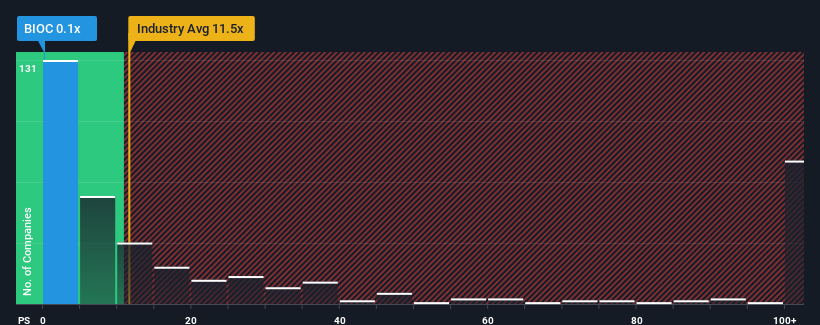- United States
- /
- Biotech
- /
- NasdaqCM:BIOC
Biocept, Inc. (NASDAQ:BIOC) Shares Fly 48% But Investors Aren't Buying For Growth
Those holding Biocept, Inc. (NASDAQ:BIOC) shares would be relieved that the share price has rebounded 48% in the last thirty days, but it needs to keep going to repair the recent damage it has caused to investor portfolios. But the last month did very little to improve the 81% share price decline over the last year.
Although its price has surged higher, Biocept's price-to-sales (or "P/S") ratio of 0.1x might still make it look like a strong buy right now compared to the wider Biotechs industry in the United States, where around half of the companies have P/S ratios above 11.5x and even P/S above 50x are quite common. However, the P/S might be quite low for a reason and it requires further investigation to determine if it's justified.
Check out our latest analysis for Biocept

What Does Biocept's P/S Mean For Shareholders?
While the industry has experienced revenue growth lately, Biocept's revenue has gone into reverse gear, which is not great. It seems that many are expecting the poor revenue performance to persist, which has repressed the P/S ratio. If this is the case, then existing shareholders will probably struggle to get excited about the future direction of the share price.
Want the full picture on analyst estimates for the company? Then our free report on Biocept will help you uncover what's on the horizon.Do Revenue Forecasts Match The Low P/S Ratio?
In order to justify its P/S ratio, Biocept would need to produce anemic growth that's substantially trailing the industry.
Taking a look back first, the company's revenue growth last year wasn't something to get excited about as it posted a disappointing decline of 24%. In spite of this, the company still managed to deliver immense revenue growth over the last three years. So while the company has done a great job in the past, it's somewhat concerning to see revenue growth decline so harshly.
Looking ahead now, revenue is anticipated to slump, contracting by 11% per year during the coming three years according to the two analysts following the company. That's not great when the rest of the industry is expected to grow by 92% each year.
With this in consideration, we find it intriguing that Biocept's P/S is closely matching its industry peers. However, shrinking revenues are unlikely to lead to a stable P/S over the longer term. There's potential for the P/S to fall to even lower levels if the company doesn't improve its top-line growth.
What Does Biocept's P/S Mean For Investors?
Shares in Biocept have risen appreciably however, its P/S is still subdued. It's argued the price-to-sales ratio is an inferior measure of value within certain industries, but it can be a powerful business sentiment indicator.
As we suspected, our examination of Biocept's analyst forecasts revealed that its outlook for shrinking revenue is contributing to its low P/S. At this stage investors feel the potential for an improvement in revenue isn't great enough to justify a higher P/S ratio. Unless there's material change, it's hard to envision a situation where the stock price will rise drastically.
It is also worth noting that we have found 5 warning signs for Biocept (3 can't be ignored!) that you need to take into consideration.
If strong companies turning a profit tickle your fancy, then you'll want to check out this free list of interesting companies that trade on a low P/E (but have proven they can grow earnings).
Valuation is complex, but we're here to simplify it.
Discover if Biocept might be undervalued or overvalued with our detailed analysis, featuring fair value estimates, potential risks, dividends, insider trades, and its financial condition.
Access Free AnalysisHave feedback on this article? Concerned about the content? Get in touch with us directly. Alternatively, email editorial-team (at) simplywallst.com.
This article by Simply Wall St is general in nature. We provide commentary based on historical data and analyst forecasts only using an unbiased methodology and our articles are not intended to be financial advice. It does not constitute a recommendation to buy or sell any stock, and does not take account of your objectives, or your financial situation. We aim to bring you long-term focused analysis driven by fundamental data. Note that our analysis may not factor in the latest price-sensitive company announcements or qualitative material. Simply Wall St has no position in any stocks mentioned.
About NasdaqCM:BIOC
Biocept
Biocept, Inc., a molecular oncology diagnostics company, develops and commercializes proprietary clinical diagnostic laboratory assays designed to identify rare tumor cells and cell-free tumor DNA from blood and cerebrospinal fluid, or CSF in the United States.
Limited growth with imperfect balance sheet.
Similar Companies
Market Insights
Community Narratives


Recently Updated Narratives


Alphabet: The Under-appreciated Compounder Hiding in Plain Sight


MINISO's fair value is projected at 26.69 with an anticipated PE ratio shift of 20x


The Quiet Giant That Became AI’s Power Grid
Popular Narratives


The company that turned a verb into a global necessity and basically runs the modern internet, digital ads, smartphones, maps, and AI.


MicroVision will explode future revenue by 380.37% with a vision towards success



